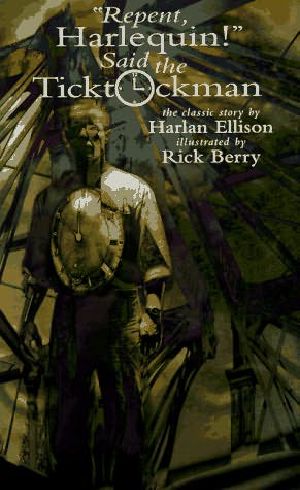Hugo Winner Short Story - 1966 - "Repent, Harlequin!" Said the Ticktockman

- Authors
- Ellison, Harlan
- Publisher
- Underwood Books
- Tags
- science fiction , fantasy , hugo winner short story
- ISBN
- 9781887424363
- Date
- 1965-12-02T23:00:00+00:00
- Size
- 0.05 MB
- Lang
- en
Galaxy Magazine, December 1965135 • "Repent, Harlequin!" Said the Ticktockman • shortstory by Harlan Ellison"'Repent, Harlequin!' Said the Ticktockman" is a short story by science fiction writer Harlan Ellison. It is nonlinear in that the narrative begins in the middle, then moves to the beginning, then the end, without the use of flashbacks. First appearing in the science fiction magazine Galaxy in December 1965, it won the 1966 Hugo Award for best short story, and the 1965 Nebula Award. The story is one of the most reprinted short stories in the English language[1] and has been translated into numerous foreign languages. "Repent..." was written in 1965 in a single six-hour session as a submission to a Milford Writer's Workshop the following day. A version of the story, read by Harlan Ellison, was recorded and issued on vinyl, but has long been out of print.
Stylistically, the story is remarkable for purposely ignoring many "rules of good writing", including a paragraph about jelly beans which is almost entirely one run-on sentence.PlotThe story opens with a passage from Civil Disobedience by Henry David Thoreau. The story is a satirical look at a dystopian future in which time is strictly regulated and everyone must do everything according to an extremely precise time schedule. In this future, being late is not merely an inconvenience, but a crime. The crime carries a hefty penalty in that a proportionate amount of time is "revoked" from one's life. The ultimate consequence is to run out of time and be "turned off." This is done by the Master Timekeeper, or "Ticktockman," who utilizes a device called a "cardioplate" to stop a person's heart once his time has run out.The story focuses on a man named Everett C. Marm who, disguised as the anarchical Harlequin, engages in whimsical rebellion against the Ticktockman. Everett is in a relationship with a girl named Pretty Alice, who is exasperated by the fact that he is never on time. The Harlequin disrupts the carefully kept schedule of his society with methods such as distracting factory workers from their tasks by showering them with thousands of multicolored jelly beans or simply using a bullhorn to publicly encourage people to ignore their schedules, forcing the Ticktockman to pull people off their normal jobs to hunt for him.Eventually, the Harlequin is captured. The Ticktockman tells him that Pretty Alice has betrayed him, wanting to return to the punctual society everyone else lives in. The Harlequin sneers at the Ticktockman's command for him to repent.The Ticktockman decides not to stop the Harlequin's heart, and instead sends him to a place called the Coventry, where he is converted in a manner similar to how Winston Smith is converted in George Orwell's Nineteen Eighty-Four. The brainwashed Harlequin reappears in public and announces that he was wrong before, and that it is always good to be on time.ReceptionAlgis Budrys faulted the story as a "primitive statement . . . about [the] solidly acceptable idea [that] regimentation is bad."[2]Wollheim and Carr selected the story for the World's Best Science Fiction: 1966.External links"Repent, Harlequin!" Said the Ticktockman publication history at the Internet Speculative Fiction DatabaseSample images (Archived 2009-10-19) from Jim Steranko's comic adaptationAmazon.com interview with EllisonDiscussions and references to criticism of the story